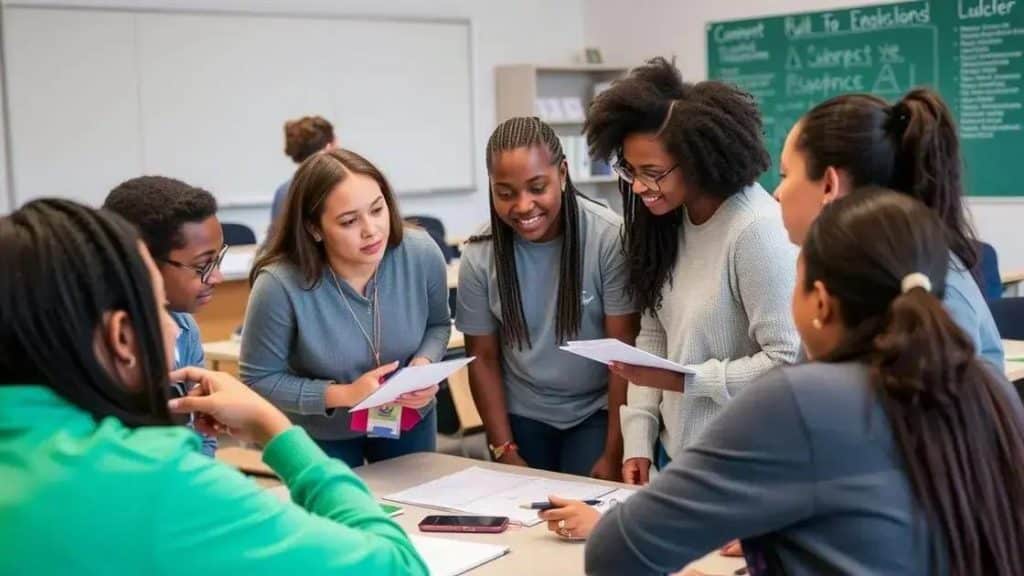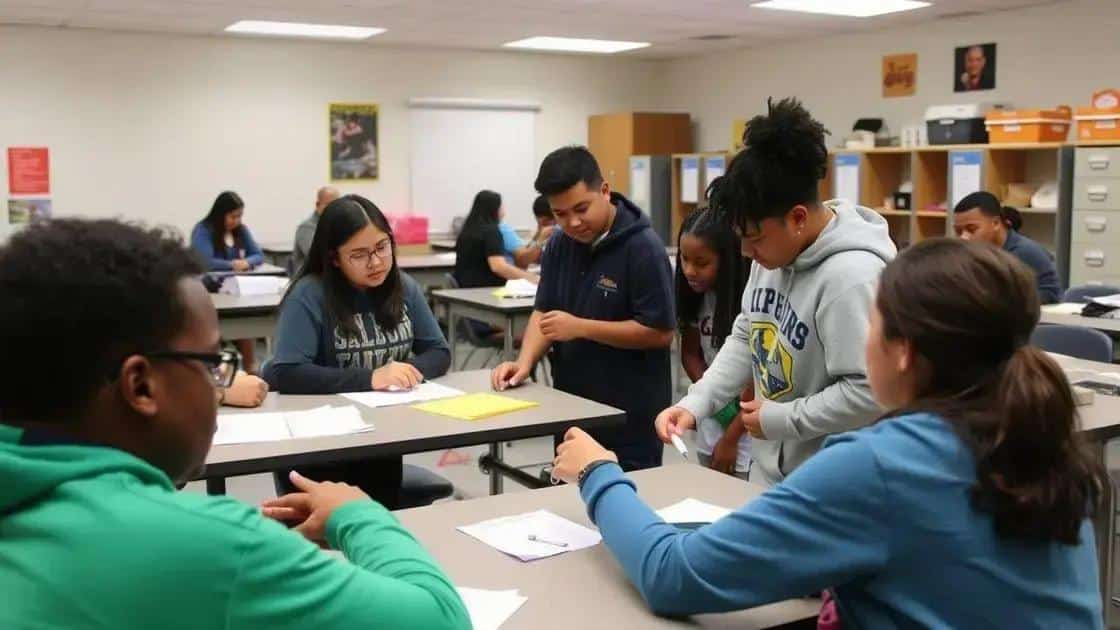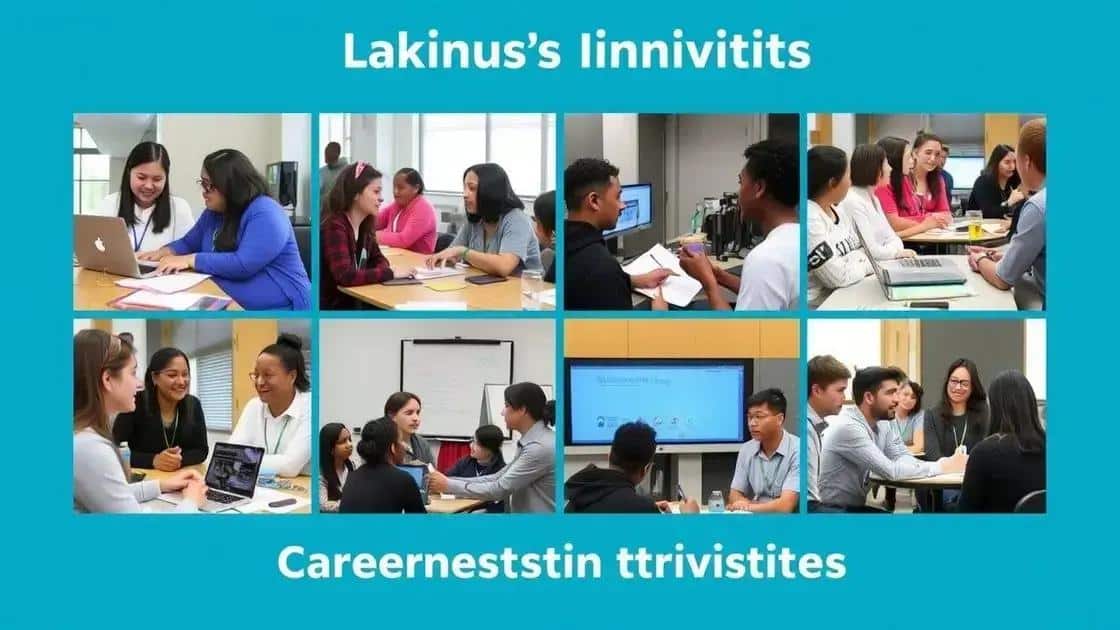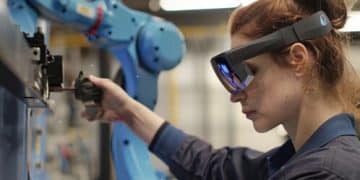Insights on career readiness programs: essential skills for success

Career readiness programs are designed to equip students with essential skills and real-world experiences, including mentorship, industry partnerships, and soft skills training, to enhance their preparedness for the workforce.
Insights on career readiness programs show how these initiatives prepare students for real-world challenges. Have you ever wondered what skills employers truly value? This article explores the essential components of effective career preparation.
Understanding career readiness programs
Understanding career readiness programs is essential for both students and educators. These programs are designed to equip individuals with the skills needed to succeed in the workforce. They focus on practical knowledge and real-world applications.
One critical aspect of career readiness is the alignment with industry needs. Program developers work closely with employers to identify the skills that are in demand. This ensures that students are prepared to meet the challenges they will face in their careers.
Key Components of Career Readiness Programs
Career readiness programs typically include the following:
- Resume Building: Teaching students how to create effective resumes that highlight their skills and experiences.
- Interview Preparation: Providing strategies and practice for navigating job interviews successfully.
- Soft Skills Development: Focusing on interpersonal skills, teamwork, and communication, which are vital in any workplace.
- Technical Skills Training: Offering courses in specific tools and technologies relevant to various industries.
Additionally, these programs often incorporate hands-on experiences, such as internships or job shadowing. This real-world exposure allows students to apply their learning and develop confidence in their abilities.
The Importance of Networking
Networking is another crucial element of career readiness. Students are encouraged to build relationships with professionals in their field of interest. By attending industry events and engaging in community activities, they can establish connections that may lead to job opportunities.
Furthermore, mentorship programs often play a significant role. Having a mentor can provide guidance and foster a deeper understanding of the industry. Mentors can share their experiences and offer valuable insights.
In summary, understanding career readiness programs involves recognizing how they prepare students for the future. By focusing on both soft and technical skills, these programs empower individuals to thrive in their careers.
Key components of effective career readiness

Key components of effective career readiness programs focus on equipping students with the tools necessary for workplace success. These programs integrate various elements that contribute to a comprehensive preparation strategy.
Essential Skills Development
Firstly, skills development is paramount. Programs typically emphasize both hard skills and soft skills. Hard skills include technical abilities relevant to a specific job, while soft skills encompass communication, problem-solving, and teamwork.
- Technical training: Courses on software, machinery, or industry-specific knowledge.
- Networking skills: Learning how to connect with professionals and peers.
- Interview tactics: Practicing responses to common interview questions.
- Feedback incorporation: Understanding how to receive and apply constructive criticism.
These combined skills create a balanced approach to career readiness.
Real-World Experience
Another critical component is providing real-world experience. Internships, job shadowing, and volunteer opportunities give students a taste of the workforce. These experiences allow them to apply what they have learned in the classroom to real situations.
Additionally, such exposure helps students understand workplace dynamics and develop professional relationships. It also enhances their resumes, making them more attractive to potential employers.
Moreover, assessments play a vital role in these programs. Regular evaluations can help identify gaps in skills or knowledge, allowing for targeted improvement.
Finally, partnerships with local businesses can enrich career readiness programs. When companies engage with educational institutions, they provide insights into the skills they seek, ensuring that programs are aligned with industry demands.
The role of mentorship in career preparation
The role of mentorship in career preparation is crucial for students aiming to succeed in the workforce. A mentor provides guidance, support, and valuable insights that can shape a student’s career path.
Benefits of Having a Mentor
Having a mentor can lead to numerous advantages. Mentorship often helps with skill development and confidence building. Mentors share their knowledge and experiences, which can clarify potential career choices.
- Networking opportunities: Mentors can introduce mentees to key contacts in their industry.
- Personalized advice: A mentor can provide tailored guidance based on the mentee’s goals.
- Accountability: Regular check-ins with a mentor can encourage students to stay on track with their goals.
- Real-world insights: Mentors can offer perspectives on industry trends and challenges.
Such benefits make mentorship a fundamental part of any career readiness program. It allows students to gain insights that formal education often overlooks.
Finding the Right Mentor
Finding a suitable mentor is essential for maximizing the benefits. Students should look for mentors who have experience in their field of interest. The relationship should be built on mutual respect and clear expectations.
Moreover, students are encouraged to engage in networking events, workshops, and industry conferences to meet potential mentors. Building these connections can lead to lasting relationships that significantly enhance career readiness.
In conclusion, mentorship is a powerful tool in career preparation. It not only connects students with professionals but also instills confidence and provides essential guidance in navigating the world of work.
Examples of successful career readiness initiatives

Examples of successful career readiness initiatives can inspire students and educators alike. These initiatives showcase effective practices that help prepare individuals for the workplace.
Industry Partnerships
One successful approach is the establishment of partnerships between schools and local businesses. These partnerships often lead to internship programs. Students gain real-world experience while companies benefit from fresh talent and ideas.
- Internship opportunities: Students work alongside professionals in their field.
- Workshops and seminars: Local experts share their knowledge with students.
- Job shadowing: Students observe professionals to understand workplace dynamics.
- School events: Businesses can sponsor career fairs at schools.
Through these partnerships, students feel more prepared and confident in their skills.
Mentorship Programs
Another effective initiative is mentorship programs that connect students with experienced professionals. These relationships provide guidance as well as insight into career paths.
Many schools implement structured mentorship programs where mentors meet with students regularly. This consistent interaction helps students develop important skills.
Mentors can assist with resume writing, interview preparation, and general career advice. Students learn not only about the specifics of different careers but also how to navigate their professional journey.
Soft Skills Training
Moreover, incorporating soft skills training into educational programs is critical. Workshops that focus on communication, teamwork, and problem-solving can make a huge difference.
Programs that enhance soft skills typically include interactive activities. Students participate in group projects and role-playing scenarios. These activities help students practice and refine their skills in a safe environment.
These successful initiatives serve as valuable models for others aiming to improve their career readiness programs.
FAQ – Common Questions about Career Readiness Programs
What are career readiness programs?
Career readiness programs are initiatives designed to equip students with the skills and experiences needed to succeed in the workforce.
How can mentorship benefit students?
Mentorship provides students with guidance, support, and real-world insights, helping them navigate their career paths more effectively.
Why are soft skills important?
Soft skills such as communication and teamwork are crucial because they enhance interpersonal interactions and overall job performance.
What role do industry partnerships play in career readiness?
Industry partnerships provide students with internship opportunities, networking, and real-world experiences that are essential for their career development.





